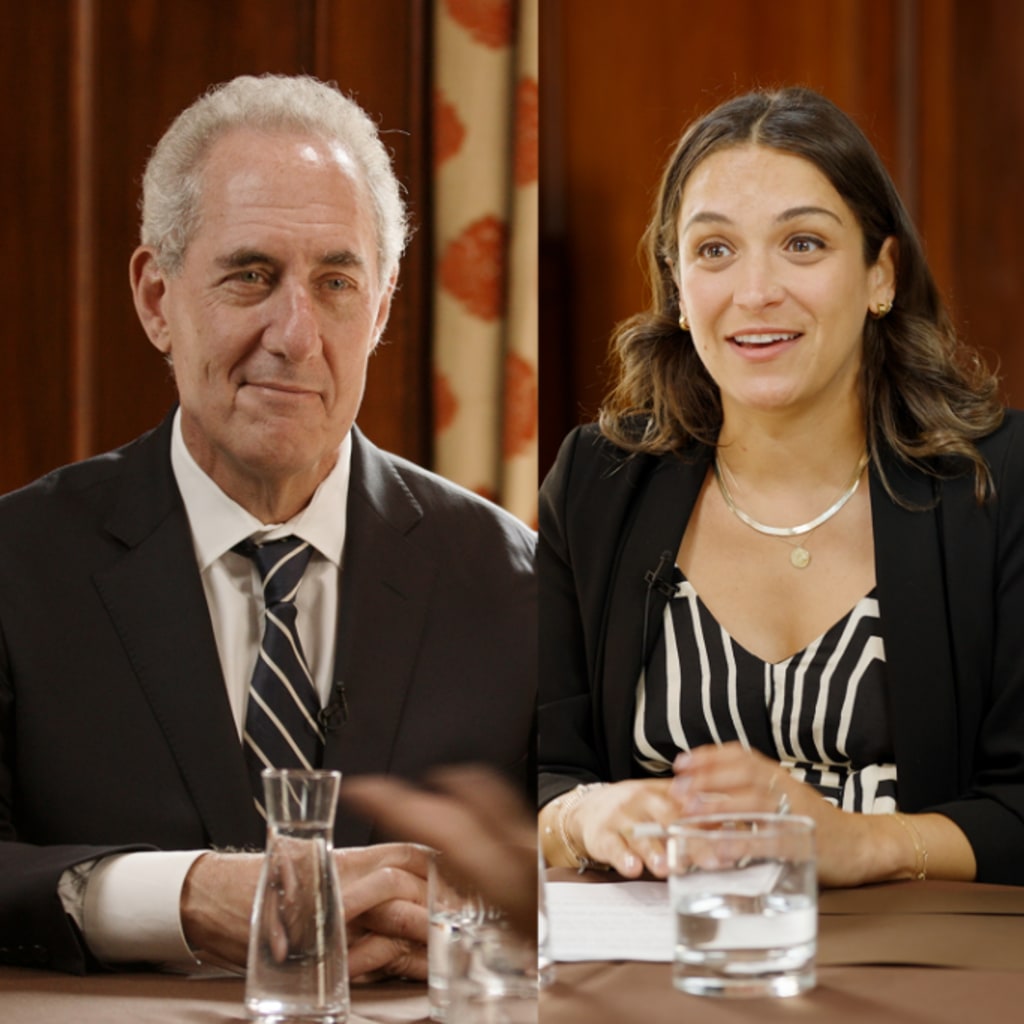China Doesn’t Want Your Trash
For years, China processed more than half of the world’s plastic recycling. Then, in 2018, it stopped. Things have gotten messy since then.
Published
Host
- Gabrielle SierraDirector, Podcasting
Supervising Producer
- Asher RossLead Content Strategist
Audio Producer and Sound Designer
- Markus ZakariaAudio Producer & Sound Designer
Associate Podcast Producer
- Rafaela Siewert
Senior Producer
- Jeremy SherlickDirector of Video
Show Notes
For years, industrialized nations across the world shipped enormous quantities of recyclable material to China. Then, in 2018, China banned most waste imports. The reversal sent shock waves through the global recycling system, and forced many towns and cities to start burning and dumping material that they used to recycle. The story of China’s National Sword policy shows how one decision by one powerful country can affect individual lives in dozens of nations around the world.
From CFR
“China’s Environmental Challenge: Political, Social and Economic Implications,” Elizabeth C. Economy
Read More
“Is This the End of Recycling?,” Atlantic
“What Happens to the Plastic We Throw Out,” National Geographic
Watch and Listen
“China’s Waste Ban Is Causing A Trash Crisis In The U.S.,” Vice News Tonight
Transcript
Let’s play a game. Name a foreign policy decision that has directly affected you. If you can’t think of one, don’t panic, you’re not alone.
Most of us don’t spend our time following the activities of foreign governments. We don’t learn much about international relations in school. Look, I work at a foreign policy think tank, and when I first came here, it would have been really hard for me to answer that question.
Part of why we don’t keep foreign policy issues in mind is that it’s hard to understand how they affect our daily lives. But there is something happening right now that does. Something we grew up thinking we were getting right. Recycling.
SESAME STREET: 00:00 Ahh that is some refreshing milk, now just gotta take my milk jug and throw it in the trash, wait a min this milk jug is made of plastic, it’s not trash, it needs to be recycled! There ya go, hey did you ever wonder what happens to stuff when you recycle it.
The Sesame Street gang, and other beloved childhood models, taught us that recycling was a local issue. Throw something in the blue bin and BAM! It comes back a little while later as something new. But the reality is more complex. For years our recycling wasn’t going down the road, but halfway around the world, to China.
But then, in 2018, China changed its mind and refused to accept our trash. And just like that, the world’s recycling system fell apart. Since then, we have been forced to see just how difficult and delicate recycling can be, and the unseen ways that our local towns and cities rely on the rest of the world.
I’m Gabrielle Sierra, and this is Why it Matters. Today, what happened when China stopped taking the world’s trash.
CBS NEWS: 00:10 When it comes to importing garbage no country bought in more of it than China.
VOA NEWS: 00:14 Before the china trash ban it had been a good relationship.
ABC ACTION NEWS: 00:47 It’s creating a huge mess.
01:02 I know a lot of people have been asking me, what are we going to do with recyclables, we don’t know.
China’s decision to stop taking foreign waste was called National Sword. It was implemented in 2018, and sent shockwaves through the global recycling system. Towns and cities across the globe that had sold their recyclable materials to China for years were forced to start dumping and burning it. So far, no large-scale solution has emerged.
But before we can understand what’s happening now, we need to get a picture of how the old system worked.
SIERRA: So let’s say that it’s 2016. I drink a bottle of iced tea and I toss it in a recycling bin because I’m responsible and I care about the environment. So what happens next? What is the step-by-step once it is out of my sight?
O’NEILL: Well, it has several different ways to go, but first of all it’s going to be picked up curbside. It then gets taken to a sorting facility… they may be cleaned, they’re sorted into different types and the baled up and sent on to their next destination.
This is Kate O’Neill, she’s an Associate Professor in the Department of Environmental Science, Policy and Management at UC Berkeley. She is also the author of a new book called Waste.
O’NEILL:But say you’re iced tea bottle was a nice, clean plastic that could easily be bundled up and shipped. There was a pretty good chance back in 2016, maybe a 50 percent chance that it would have been sent to China.
SIERRA: And now?
O’NEILL: And now it is sent to landfill.
You may not be too surprised to hear this but the US generates a lot of trash. Nearly 250 million tons per year. Of this about a third is designated for recycling or compost. But it was never very cost effective to process these recycled materials at home. It was just simpler, and cheaper, to sell it to China and be done with it. Until 2018, this meant that the U.S. sent around 40 percent of its recyclables halfway around the world.
And the U.S. was not alone. Canada, Australia, Germany, Britain and other developed nations were shipping vast quantities of waste there, too. At its peak, China was absorbing around 70 percent of the world’s plastic waste annually.
SIERRA: So how was this system first put into place? Why did we decide that it was a good idea to send our recyclables to China as opposed to handling them here?
O’NEILL: It’s not just we wanted to send our stuff there, it’s that companies in China wanted it. They had a strong demand. China’s economy in the early 2000s was booming. We saw growth rates of 10 percent and upwards. And that meant that Chinese manufacturing centers really needed new materials. And China did not produce enough virgin plastics on its own, nor did it really have its own recyclable market. So essentially—companies in China started buying plastic scrap and many other kinds of scrap. This coincided more or less with China joining the World Trade Organization—in other words, becoming part of the global trading system in an integrated way and also the time where you started seeing many more Chinese consumer goods enter the U.S. market.
ECONOMY: I’m the C.V. Starr Senior Fellow and Director of Asia Studies at the Council on Foreign Relations. For the past two and a half decades, I’ve researched and written on China, Chinese foreign and domestic policy, China’s environmental politics, and U.S. China relations.
I think it’s very important to recognize that the Chinese made money from this process, not only from the ability to use the recycled waste in their own products, right? Plastics that went into their textiles and their t-shirts that then they exported back to, you know, Walmart, into our stores here in the United States. But also there are people in China who are billionaires from this recycling process, became, you know, cult heroes in China because of this. So, it certainly wasn’t a conscious decision on the part of the United States to offload our pollution to another country without a second thought. There were advantages that were understood on both sides of the equation. It was a business decision.
The system seemed perfect. Here’s how it worked. Ships would cross the Pacific full of Chinese goods. Once they were unloaded, the hulls were filled with recyclables and sent back to China. After arriving there, they were sorted, recycled, turned into new, affordable goods and shipped back once again to the Walmarts of the West.
Everyone got what they wanted. American towns and cities were able to make money by selling their waste to Chinese recyclers. They made money by selling recycled materials to Chinese manufacturers. And they made money by selling new goods to American consumers.
As crazy as it sounds, the system was cost effective. As a result it was cheaper to ship plastic from the U.S. to China than to ship it from the west coast to the east coast.
ECONOMY: It’s not just the United States. Don’t forget, it’s really many advanced industrialized economies from Australia, to Japan, to the European Union. We needed a place to put our waste. We didn’t want to keep growing our own landfills and going through the process of incineration. We’d had our environmental consciousness sort of awakened already. So it seemed to be a fairly virtuous cycle. But again, there was so much waste that was coming that truly wasn’t recyclable. And the nature of China’s recycling process was actually quite damaging to the health of many people, that I think it was a wake-up call for the Chinese government.
China thought it had a great deal at first, but as they churned through the world’s trash, it became apparent that this lucrative new business was also causing a great deal of harm.
O’NEILL: We really started getting sloppy with what we sent. And this is not just the U.S., but all the countries that were doing this, to make recycling easier for U.S. consumers, we tend to rely on single-stream recycling where you throw everything into one particular bin. As you can well imagine, it increases contamination rates by a lot.
Second, we’re producing much larger volumes of plastics, waste, and scrap. I think that that’s something that has really taken off over the last twenty to thirty years, especially with the greater use of single-use disposables. So there was more stuff, harder to sort, harder to clean. So generally, the bales that were being shipped to China, rather than being the high-quality plastics that China really wanted, it was actually far lower, far dirtier, more expensive to clean, and with greater environmental damage imposed and human health damage imposed on the people actually doing the recovery and reprocessing in China.
So it was really, you know, we kind of let the scrap get dirty. That’s the big part of the story, China got fed up with it.
Contaminated shipments led to problems with waste disposal, incineration, and illegal dumping all across China. And the Chinese people suffered for it with polluted waterways, air, and soil. And so the government implemented National Sword, bringing the world’s recycling system to a grinding halt. Some experts even called it a recycling “earthquake.”
It’s kind of wild when you stop to think about it. A small group of policymakers, thousands of miles away, made a local decision and it had a global effect. And it changed what happens to your trash, in your kitchen.
But these decisions don’t happen in a vacuum. The implementation of National Sword emerged from something that had been stirring in China for years.
ECONOMY: If you look back to 2010-2011, you had the emergence of a pretty significant environmental movement within China—broad-based, civil society movement that was pushing for, above all, cleaner air quality, but also water and soil contamination rose pretty close to the top of the agenda for the new Chinese leadership that came into power in 2013, headed by Xi Jinping. And they began to understand this issue of environment as a source of legitimacy. If they couldn’t address the environmental challenges in the country, that was going to affect their leadership legitimacy. And so in pretty quick succession you had broad action plans coming out from the government around air quality, water quality, and then soil contamination. Again, the environment was really the largest source of social unrest in China, up and through 2010-2011. So China felt that this was, you know, potentially a source of pretty significant instability for the Chinese government. Also I think there’s a sense now within China that it is no longer a developing country, right? China no longer wanted to be that low-cost manufacturing center of the world. It wants to be the innovation center of the world. It doesn’t want other countries to affect or to shape so deeply what’s taking place within China. It’s now a global power that is affecting other countries and affecting global dynamics.
So I think it also reflects, you know, there’s an issue of Chinese pride, that means that being the receptacle for, you know, half the world’s waste is not necessarily the role that China wants to play.
News: General Secretary Xi Mentioned innovation 59 times.
WENDOVER PRODUCTIONS: 03:20: Across the continent China is playing a part in projects both big and small, they are transforming African Economies.
NBC NEWS: 00:03 For years there have been territorial disputes over the South China Sea, China has laid claim to most of the area.
FINANCIAL TIMES: 00:02 The Belt and Road initiative, China’s plan to spread soft power around the world, by building roads, railways, and bridges.
The more I learned, the more I started to understand the sheer scale of what China has been doing. They’ve been expanding their role on the world stage in a massive way.
So, here we are. China has moved on from the trash business. But that doesn’t mean the rest of the world has stopped producing trash. And it has to go somewhere, right?
ECONOMY: Many countries, the United States included have simply shifted their exports their waste exports from China to other countries, like Thailand, Vietnam, Malaysia, and Indonesia. And many of these countries have been now inundated with waste. And a number of them have said: We’re not going to accept any more waste. They’re passing their own regulations to try to control and to limit the amount of imported waste.
SIERRA: Just because they can’t handle this much?
ECONOMY: Right. We’ve overwhelmed them.
ECONOMY: I think the lesson of China is being more broadly understood as one of the serious consequences of recycling and accepting contaminated waste from other countries, serious consequences for the environment and for the health of a country’s people. And so it would be difficult, I think, for leaders in other countries at this point to become the new China. And I think that’s why we’ve seen Vietnam, and Thailand, and Malaysia, all, and Indonesia now as well, push back against the opportunity to be that new China.
But here’s the thing, why do we keep relying on other countries to handle our trash?
SIERRA: Do you think that there is a chance that this happening, that National Sword will lead us to just handle all of our stuff at home?
O’NEILL: Handling everything at home is something that a lot of activists and environmentalists see as critical. Like, we must take responsibility for our own waste. Is that practical? I’m not sure, it never has been. We’ve always outsourced and distanced our waste, whether it goes for safe handling overseas, that would be just fine as long as it’s safely handled. I don’t have, personally, any problem with that, nor do I see any easy way that that can be stopped.
O’NEILL: I think when you’re looking at people’s lives and daily practices with respect to trash, one of the impacts I’ve seen is a lot of disillusion and maybe even you could say mild depression about the effectiveness of recycling. I think a lot of people are feeling that all of these things they’ve been doing for so long, basically throwing this stuff into the blue bin, does mean it’s been recycled at all. And we are well aware with recent analyses and reports that really only 10 percent of plastics in the United States are recycled at all. And even then, they’re not recycled back into the same quality. They are what we call down-cycled, that the next product is inferior and it’s very hard to recycle any plastic product more than once. So I think this greater awareness has been very disillusioning for a lot of people.
I’m not one of those people who says that recycling, I think I’ve seen one headline is, like, putting a Band-Aid on gangrene. I think we definitely need recycling. We’re not going to be stopping producing plastic anytime soon. And just simply to say we should just stop recycling and that’ll solve the problem is kind of akin to saying we shouldn’t adapt to climate change because if we adapt to climate change we’re going to stop mitigating, we’re going to stop emissions reductions of greenhouse gases.
SIERRA: I mean, in a way it feels very hopeless, because you feel like you can’t recycle in your own kitchen anymore. But at the same time, it also feels like a step that’s necessary in addressing how we handle our trash, how we handle our waste, and our recycling.
ECONOMY: Well, absolutely. And I think if you look in the United States at what’s happened since National Sword, since China put in place these new regulations, certainly some of what we’ve seen has not been positive.
So a number of cities, for example, have sort of halted their curbside recycling because they don’t have a place, now, to send their waste. But other cities—I think cities that were already thinking sort of ahead of the curve, like San Francisco and other companies are taking the initiative to do more. I think there’s a broader sense in some parts of the United States, in some cities, and amongst some companies, that we need to get ahead of this problem, we need to do the right thing.
And importantly, that environmental protection and economic development can go hand-in-hand, that they can be integrated in a way that will allow them to continue making money, right, by doing the right thing. So I think that maybe our current administration in Washington doesn’t understand that, but I think at the local level, and in some cities, they do get that. And so at some level I’m quite hopeful, frankly, that this Chinese move is going to be a spur to more of that thinking and actually, to making us take a leap forward in terms of how we think and deal with our use of plastics and other materials.
It seems like this should be the part where I list all the ways that countries are currently solving the plastics and waste problem. That the US is finding a new place to send our trash, where a new, clean method has been developed to process it and send it back. But, as of now that’s not the case. Of course there are things we can and should do - refuse single use plastics, encourage companies to rethink their packaging, take action at the state and local level - but so far there are no grand plans for what comes next.
It’s a huge problem for us, and we are already seeing the effects at home. Some local governments are no longer recycling at all. Some are burning trash and polluting the air, often in poor communities and communities of color. There’s no way to sugarcoat it, it’s really bad.
But National Sword has forced us to think about the future. It has shown us how fragile our systems are, how much we rely on other countries and their policies, and how a local issue can become a global one and affect us, well… locally.
So if you’re saying to yourself, ‘Hey, I want to learn more!’, then that’s awesome. You should visit us at CFR.org and you can find a page for this episode, it includes things like show notes, a transcript, and links to a bunch of great articles and resources.
Subscribe to Why It Matters on Apple Podcasts, Spotify, Stitcher, or wherever you get your audio. Be sure to leave us a review, give us some stars, and please, talk about us to your friends! We want to hear from you directly too, so holler at us. Our email is [email protected].
Why it Matters is a production of the Council on Foreign Relations. The show is created and produced by Jeremy Sherlick, Asher Ross, and me, Gabrielle Sierra. Our sound designer is Markus Zakaria. Robert McMahon is our managing editor, and Doug Halsey is our chief digital officer. Our researcher is Rafaela Siewert. Original music was composed by Ceiri Torjussen. Special thanks to Richard Haass and Jeff Reinke.
For Why It Matters, this is Gabrielle Sierra, signing off. See you next time!






